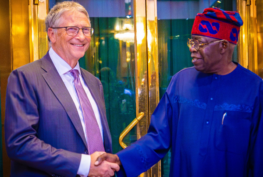Nigeria newly elected president Bola Ahmed Tinubu Hits the ground running as promised.
Bola Ahmed Tinubu, one of the leading candidates in the just finished 2023 presidential election, was unambiguous in his pledge to get to work right away if elected as the Federal Republic of Nigeria’s 16th president during the campaign.
Many Nigerians were skeptical of this promise of his. Politicians in Nigeria are known for frequently speaking from both sides of their mouths. But in keeping with his campaign promise, it appears the President has already made a strong start by eliminating the fuel subsidy. He also declared that the time of subsidies was over and that moving forward, money for subsidies will be shifted to other urgent needs like public infrastructure, healthcare, education, and jobs.
“We applaud the outgoing administration’s decision to phase out the fuel subsidy regime, which has progressively favored the wealthy over the poor. In light of depleting resources, subsidies can no longer be justified by their rising costs, according to Tinubu.
Furthermore, he continued, “We shall, instead, re-channel the funds into better investments in public infrastructure, education, health care, and jobs that will materially improve the lives of millions.”
This announcement struck Nigerians like a bolt of lightning out of nowhere. Few people would have thought Mr. President would undoubtedly get off to a flying start right away. Despite purchasing the PMS in their tanks at a reduced price, fuel station owners hiked the price of petrol as was expected. Some even shut down their gas stations in order to stockpile in preparation of the kind of scarcity that would allow them to sell their goods for more money. This only serves to demonstrate how similar we, the followers, are to our leaders despite all the criticism we level at them. We are where we are because of our predisposition to unfairly exploit every circumstance.
Fuel subsidies have undoubtedly hindered the nation’s ability to experience long-term economic progress, which is beyond dispute. Even eminent economists share this opinion, including Dr. Akinwunmi Adesina, the head of the African Development Bank. In his words, “Fuel subsidy is killing Nigeria’s economy, costing it $10 billion alone in 2022.” According to a research by the Nigeria Extractive Industries Transparency Initiative (NEITI), Nigeria spent $74.39 billion (N13.69 trillion) on subsidies between 2005 and 2021.
Previous administrations’ attempts to end the subsidies frequently ran into resistance. To lessen the pain that its loss would result in, the previous administration attempted to completely eliminate the subsidy and replace it with a 5,000 allowance in November 2022. However, this strategy was abandoned after the Trade Union Congress and the Nigerian Labour Congress threatened to go on an indefinite strike.
It’s improbable that his administration will change course in their efforts to ensure that gasoline subsidies disappear in the wake of the current President grabbing the bull by the horns with this historic decision. The fortunate construction of the new Dangote Refinery, which not only has the capacity to produce 650,000 barrels of crude per day to meet Nigeria’s domestic consumption needs, but could also result in foreign exchange savings of between US$25 billion and US$30 billion per year for Nigeria, according to the Central Bank of Nigeria, further supports this unlikelihood.
It’s interesting to note that Mr. President didn’t only get things going by eliminating subsidies. He has also made a single exchange rate since it would assist channel money away from arbitrage towards worthwhile projects that are necessary to bring about a significant economic reform in the nation.
Because the security of people’s lives and property is every government’s top priority, Tinubu plans to address security issues in addition to the economic sector. He informed the Service Chiefs and the Inspector-General of Police at his first meeting that all security organizations under his control must work together to effectively carry out the responsibility of guaranteeing a secure nation. When he instructed the Department of State Services (DSS) to leave the Economic and Financial Crimes Commission’s office in Ikoyi, Lagos, Tinubu further indicated his desire to have a unified security sector.
This order became essential after numerous DSS agents stormed the EFCC office in Ikoyi and forbade agents from the organization from entering the structure. Additionally, they sometimes fired into the air as if they were armed thieves on a nefarious mission. An insider report claims that there has been an ongoing conflict between the two government organizations on who actually owns the facility. A day after the new President was sworn in, the DSS officials agreed to end the dispute once and for all. But Mr. President, being the diligent man that he is, did not play the ostrich. The outcome would have undoubtedly been disastrous if he did. As a result, his quick reaction to the DSS and EFCC altercation is evident.
Making wise decisions for everyone without caring whose ox is gored is one of a good leader’s most crucial traits. Since taking office, President Bola Ahmed Tinubu has not made a mistake, and if he continues in this vein, he may even win over those who passionately opposed his candidacy. Since few Nigerians had faith in the late President Umaru Musa Yar’adua, this is hardly surprising. In fact, he explicitly acknowledged how fraudulent the 2007 presidential election was that put him in office. However, he would go on to capture the hearts of many Nigerians and leave behind a legacy (especially thanks to his Seven Points Agenda) that the majority of us frequently think back on with wistful nostalgia.
Mr. President should be warned of saboteurs, both inside and outside the country, and should continue to be on the lookout for their sneaky plots as he continues to move quickly. Those who have long benefited from the subsidy system and other unwise government initiatives that are about to be discontinued won’t just sit back and accept defeat. Adversity frequently results from progress. Even the Vice President, Kashim Shettima, GCON, admitted that oil scam cabals were extremely powerful and would do whatever it took to thwart the President’s choice. As Tinubu begins to guide the nation’s ship through turbulent waters and into kinder shores, it is imperative that well-meaning residents of this wonderful nation unite behind him.



No Comments